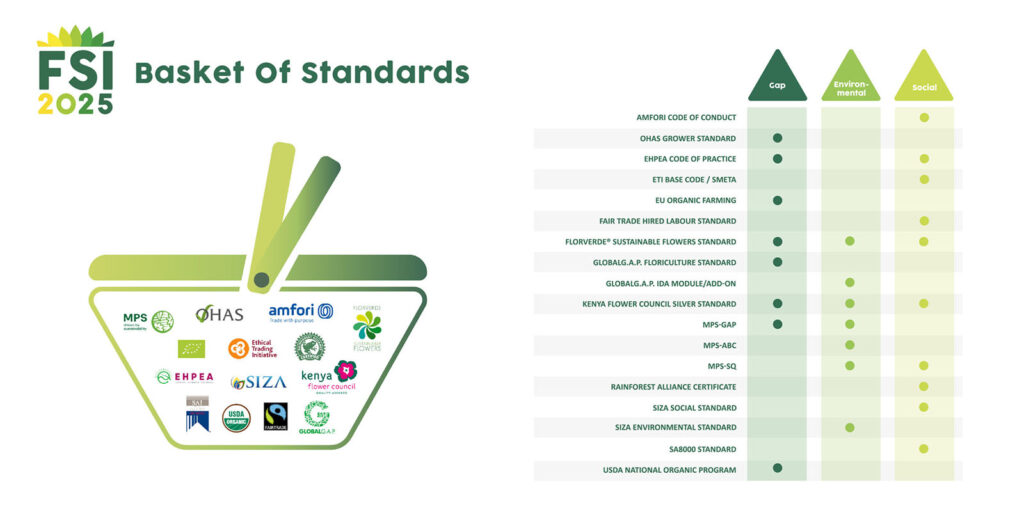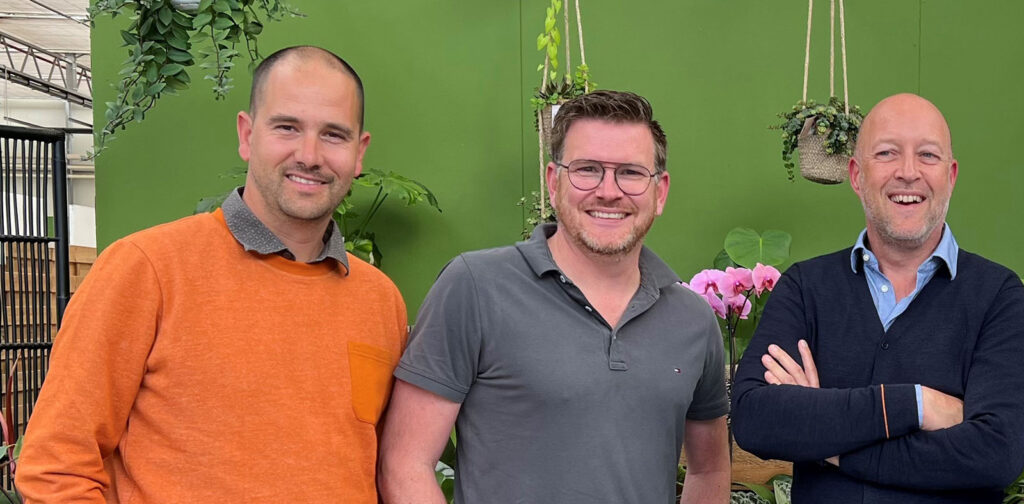Since March 2022, Floréac has been a member of the Floriculture Sustainability Initiative (FSI). Together with other partners from the flower and plant sectors, we are committing to a sustainable supply chain in the years ahead. In concrete terms, by 2025, 90% of the plants that we trade must be produced sustainably. This will be a new milestone in our history.
Jeroen Oudheusden (Executive Officer, FSI), Pieter Van De Velde (Purchasing Manager, Floréac) and Wico van Dam (Quality Coordinator, Floréac) explain the added value for the sector.
How did FSI come about?
Jeroen: “The foundations for FSI were laid in 2012, when a number of players from the flower and plant sectors sounded the alarm bell. The government was increasingly demanding sustainability and consumers were also becoming more critical. Although a few things were happening here and there on the fringes, there was no centralised approach – and that had to change. To prevent others from setting our agenda, we needed to take matters into our own hands. Soa network of pioneers got together: multi-stakeholders who wanted to collaborate to create an agenda with an impact. We started in 2013 with 18 members.
Our first step was the certification, which needed to be more transparent and uniform. We checked all the existing certificates against a number of requirements – basic principles relating to the environment and social aspects such as working conditions. On this basis, we compiled a ‘Basket of standards’, a benchmark for good practices. We also linked this to the ambition to grow and trade 90% of products sustainably by 2020.

In addition, we began working together on a number of important themes. This is how our initiative has grown. In 2020, we formulated a revised 2025 strategy that enables organisations to make the right choices based on the right data. Measuring the carbon footprint is an important step in this regard.”
Why is FSI so relevant?
Jeroen: “Why are we doing this? We want to futureproof the sector and to be one step ahead of the legislation. Because one thing is certain: soon everyone will be obliged to map out the entire supply chain openly. So it’s better to be well prepared.
Our underlying philosophy is actually very logical. Nature is the most precious thing we still have, especially in the light of climate change. It’s unacceptable for us to trade products from nature that have been produced at the expense of nature and people.
Our story has to be right. And for that, the whole supply chain must be in order. Your pot might well be made of recycled plastic, but if you’re using a pesticide that’s harmful to bees you’re not doing the right thing. You aren’t acting with integrity, and consumers will fall by the wayside. That’s why we are insist on this certification. It’s an important tool and guideline for making good choices.”

Why is FSI so important to Floréac?
Pieter: “Floréac wants to be a pioneer. In the past, it might have been the other way around. Back then, we thought it was enough to set a good example so that others might follow in our wake. But today, more is required. We don’t need to shift up one gear, but three. After all, you can’t fail to notice how important sustainability has become to consumers; they could switch overnight to only buying products of ecological origin. A trading company can’t change course that quickly, so we need to take action now, to be proactive.
FSI has the experience required to get us into a higher gear. Incidentally, our participation in this is not the only step we are taking towards a future-proof floriculture sector. We have also embedded sustainability into our new strategy, with the appropriate name Growing Together 5 (GT5). ‘A better world’ is one of the five pillars on which our policy is based. It covers all the initiatives that we will be rolling out in the years ahead as we move towards a better world. In this context, FSI is an important tool for getting us where we want to be by 2025.”
Jeroen: “Sustainability brings people together. We certainly haven’t chosen the easiest path, but sitting around the table with each other allows you to create a partnership instead of a distant customer relationship. You see each other as equal.”
“Sustainability brings people together. We certainly haven’t chosen the easiest path, but sitting around the table with each other allows you to create a partnership instead of a distant customer relationship.”
Jeroen Oudheusden
What are the objectives and which actions are planned to achieve them?
Pieter: “Under the ‘Better World’ pillar, we have formulated three specific objectives that we will now be putting into practice:
- Reducing our carbon footprint
- Increasing awareness among suppliers, customers and our own employees
- Growing support among our own employees.”
Wico: “We have already started with the first objective, the measurement. By 2025, our CO2 emissions need to be reduced by 30%. I am expecting the initial results shortly after the summer, and we will use them to draw up an environmental action plan by 2023.”
Pieter: “The second objective is also ongoing. We are communicating as broadly as possible to motivate growers to join us. Stating our goals out loud in this way also holds us accountable. We have to walk the talk and we need to do it together.
Our message is clear: from 2025, certification will be a selection criterion. If we want to achieve our 95% sustainable purchasing goal, from then on we will only work with growers whose certification is in order. As a result, there is a high level of urgency to get certified.”
Wico: “In order to make our story public, it is also important for it to be supported internally by the employees. And this is not just when they are in the workplace, but also outside, in their own families, and in the neighbourhoods that surround the business… The ideas must come from the bottom up. Our dream is that we will come up with so many initiatives that we have to make choices.”
“From 2025, certification will become a licence to sell. The certificate isn’t just a piece of paper. As a grower, it allows you to demonstrate that you have your entire growing process in order.”
Pieter Van De Velde
Why is it so important for growers to become certified?
Pieter: “From 2025, certification will become a licence to sell. The certificate isn’t just a piece of paper. As a grower, it allows you to demonstrate that you have your entire growing process in order, and that you have reliable data.”
Wico: “This data is actually very important. The legislation will soon require every step in the supply chain to be documented in a transparent manner. In the store, you will be able to read the footprint of each plant. You might have the most beautiful plants as a grower, but if you don’t meet the standards you will lose your key to the market.”
Which role will Floréac play in this transition?
Pieter: “2025 isn’t that far away, so the time to act is now. But this doesn’t mean that growers will need to find everything out for themselves. We realise that this is a major step for many growers, especially in Belgium because the nurseries there are usually smaller. They don’t have enough manpower to invest in it. We are not abandoning them to their fate, but showing them best practices, inviting them to information sessions and lots more besides.
In short, we are taking on a connecting role. It’s not without good reason that our motto is: Growing Together.”
